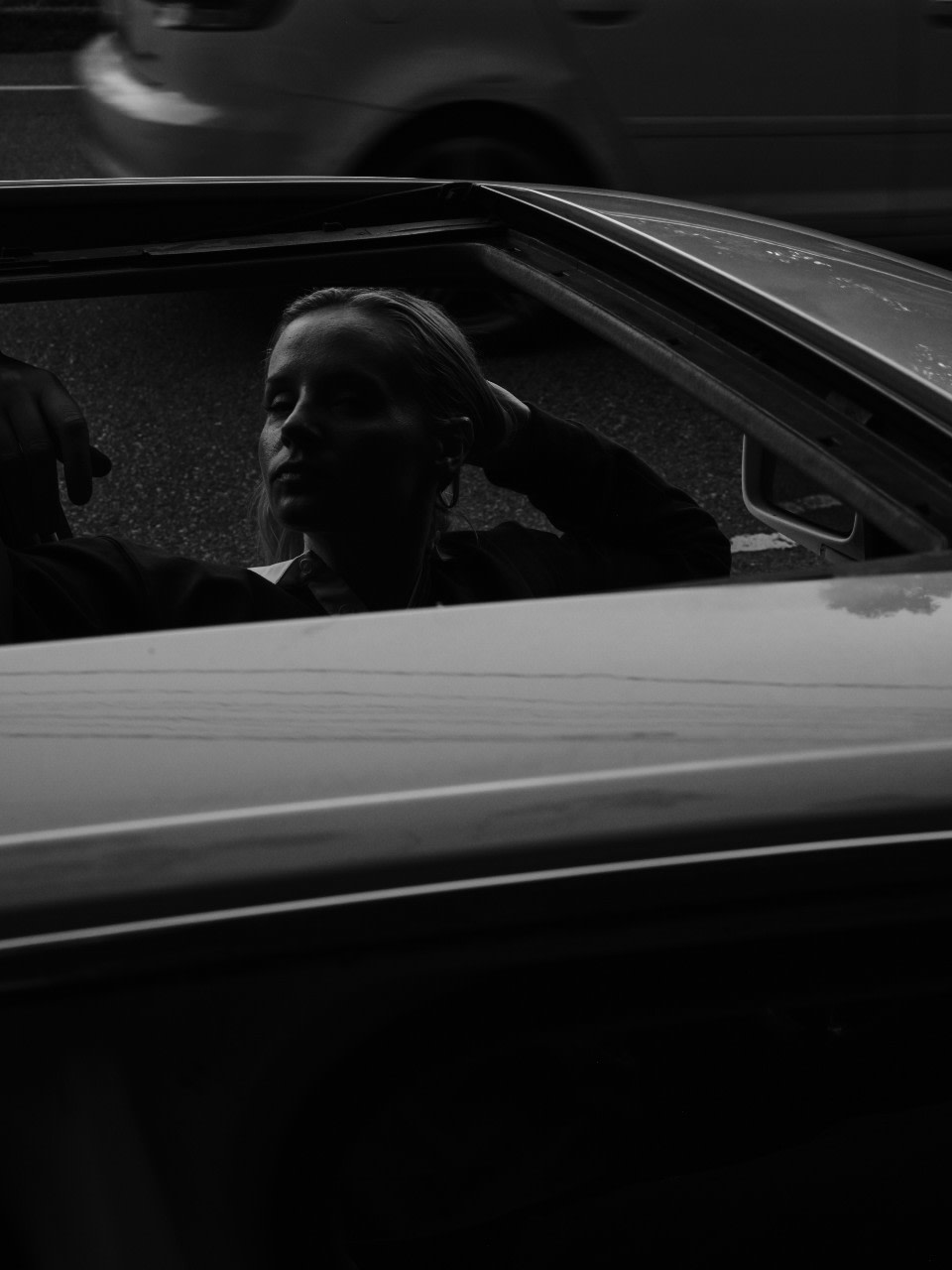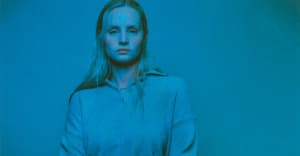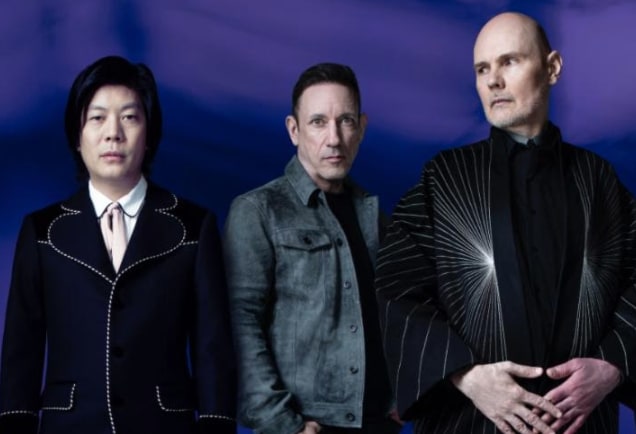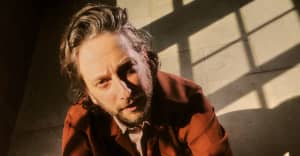Emily Lipson
Charlotte Day Wilson can make her words hit like a ton of feathers, soft in their presentation yet undeniable in their cumulative impact. “I went to a funeral today just so I could feel something,” the Toronto artist sang on “Funeral,” a morbid highlight from her 2018 EP Stone Woman. Across that breakout project and its follow-up, her 2021 debut album Alpha, Day Wilson toiled over break-ups and the accompanying anxiety, self-doubt, and pain. The heavy impact of her songs, seemingly written under the sheets or moments after the door angrily slammed shut, was cushioned by Day Wilson’s love of velveteen R&B.
Day Wilson’s latest project, Cyan Blue, is a new chapter. The music is far less tormented and more assured, partly a reflection of the stability Day Wilson has found in a loving relationship as well as a conscious effort to abandon cynical ways of thinking. Speaking from her home in Toronto, her trusty piano in the back of the Zoom shot, Day Wilson describes the album as “a celebration of reconnecting with the parts of my inner child that I had let go of or had been suppressed.”
That freedom came through collaboration. Though she has worked with local friends like Mustafa and BadBadNotGood in the past, Day Wilson’s projects have always been self-produced. In a bid to escape what she describes as “perfectionist tendencies,” she worked alongside producer Jack Rochon on the album. She credits Rochon, whose work includes Beyoncé’s Cowboy Carter, with pushing her to be the best she could be while avoiding getting bogged down in the details that she felt had marred recording in the past.
Read on for Day Wilson’s thoughts on her new approach to making music, the songs that best reflect her renewed sense of innocence, and how a recent co-sign from Patti Smith has left her feeling uncomfortable.
A theme of the album is writing songs from the perspective of your younger self. What qualities from that time do you wish you could have held onto?
I honestly feel like I am reconnecting with a lot of those qualities that I lost for a period of time, and that’s what this album represents to me. I was really indulging in the imagination. That’s a big one that we lose as adults: how to imagine worlds and lock into a flow state of no distraction, where it’s just you and your imagination. I feel really lucky as an artist to be allowed to have the time and space, and to be encouraged to indulge in those imaginary worlds.
It’s funny but I played sports really intensely as a child. Then, from my early 20s, I didn’t exercise at all. Recently I have been reconnecting with that part of myself in a way that brings me back to childhood. I feel like I have all of the same routines that I had as a kid at this point in my life. I play tennis almost every day, and I do strength, like weightlifting and stuff, and then whenever I get the chance to, I’ll play basketball and also hockey. It makes me feel really connected to who I was before the hardening of adulthood and the music industry got to me.
The other side of the album is wishing you could relive your youth with the knowledge of adulthood. What kind of wisdom would you pass on to the teenage Charlotte?
First and foremost, be yourself. I think that’s the hardest question that teens and young adults are faced with, “Who am I?” Early on in my music career, there were a lot of people encouraging me to just stay true to myself. But I didn’t quite know who I was at that point, maybe because of all the things that distract and bring us further from our core childhood selves.
I would also say something like, “You will find who you are and you will not be alone and feeling confused as to why you can’t see yourself in anyone around you. You’ll find love, first of all, and second of all, a community.”
Was there anything you wanted to capture with Cyan Blue that maybe you didn’t or couldn’t on Alpha?
I wanted to work in a way that was different and a little bit more uninhibited than how Alpha came together. Jack fosters a very safe space in the studio and it just felt like we were pushing each other out of our comfort zones. We both have slightly perfectionist tendencies, and so we were pushing each other to just follow our intuitions, not editing any instincts musically or creatively. It was fun to kind of have a partner in crime for that.
In what ways would he push you?
He would be honest with me when he thought something was not up to par. That liberated me. He was totally open about just saying, ‘That’s not quite it. Just keep going.’
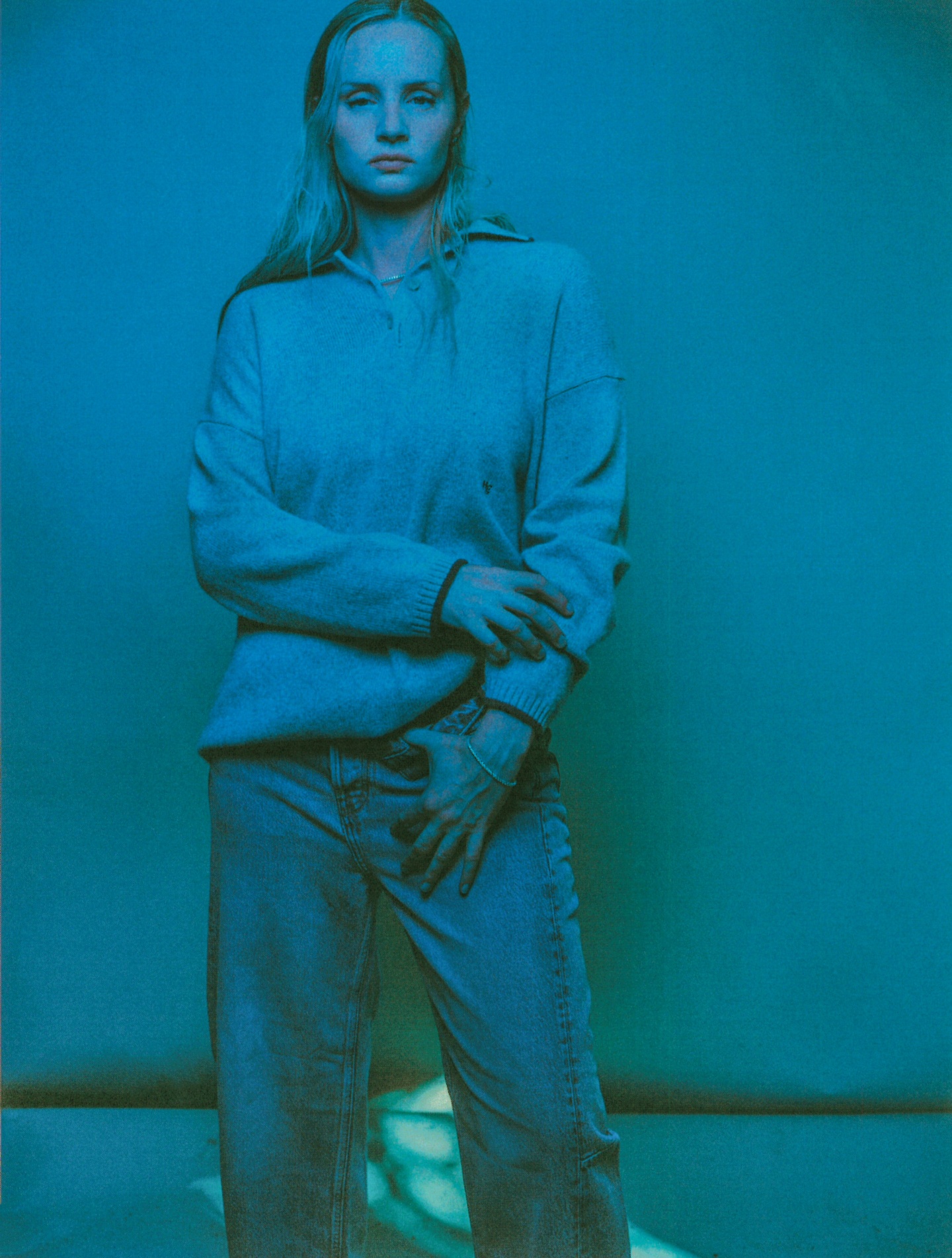
Emily Lipson
An artist’s second album is an opportunity to try new things. Is there any song on Cyan Blue that you can point to where you really feel you are pushing yourself in a new way?
“Do U Still” is a funny one, because it came about as a joke, and I think some of my favorite things that I’ve made have come about in this pure state of play. We had finished working for the day and I was taking longer to pack up than Jack was. He was ready to go and he started playing some chords on the piano while he waited. I jokingly started singing the lyrics of “Do U Still,” pretending to write a song and just screaming them at him. Then we both realized it could just be a new song. I like when things come about in a really completely uninhibited state of play.
We all are who we are from a very early age, but the world and society kind of gets in our heads, and makes us question our instincts, and question the imagination that can be super creative to lean into. That’s something that I really wanted to capture with this project.
“Forever” samples The Foundations’s “Baby Now That I’ve Found You.” What was it about that song that made you want to sample it?
There’s this Alison Krauss cover of that song, a super beautiful country version, that my dad used to play growing up all the time. I just sat down at the piano one day and was like, “Let me learn this song, it’s so pretty.” I make samples all the time and that ended up being one of them.
Something that I was dealing with when I was working on the album, and it’s kind of heady and existential, was what you feel when you meet someone who you actually feel like you could spend the rest of your life with. It’s the most beautiful feeling but you also have to confront your own mortality when you think about forever with someone, because forever is not infinite.
That’s something that I was working through a lot on this project. That feeling of, “Wow, I might have met the person that I want to spend the rest of my life with, but that’s not enough time with them.”
There’s a brief cover of “Over the Rainbow” on the album. I wonder if you could tell me a bit about how that fits into the themes or the ideas of the album.
The rainbow, obviously, is a signifier for the queer community. I don’t know if I’ll say too much about what inspired me to talk about maybe someone or something being “over the rainbow,” but not quite as involved in the queer community anymore. I was lying in bed and laughing to myself about someone being over it, being over that time of their life. Then when I was listening to the lyrics, I definitely started finding more connections and metaphors that tied in with themes that I was already singing about on the album.
“New Day” is written about having children in a queer relationship. I’m not sure I have heard anyone sing from the angle you take on that song before. Was that partly why you wrote it?
I think that song is my favorite one on the record, and also the most personal and vulnerable. It’s something that I’ve thought about a lot, and that folks in my community have thought a lot about.
Watching people around me have children, and how so much of the experience of meeting two people’s child, in our culture, we’re so obsessed with being like, “He has your eyes and your nose.” While I love doing that too with the folks in my life there was always a little bit of sadness attached to those moments for me, because I’d be thinking about the fact that that’ll never happen for me.
Those were some big feelings that I needed to write about. I knew after I had written it that I also hadn’t heard anything like that. It felt important to include on the record. I think in some ways, the song feels more like a celebration of coming to terms with the fact that any child that I raise will be my child no matter what.
Someone I wanted to talk about outside of the album is Patti Smith, who is a big fan of yours and has covered your song “Work” live for a few years now. That must have been surreal for you?
It was really moving at first. I read Just Kids at a pretty formative time of my life and it did inspire me to pursue a creative lifestyle in a lot of ways. Hearing her cover “Work” was one of those big kind of “pinch-me” moments, too. Since then, however, I’ve been made aware that she has a song from the sixties called “Rock and Roll N Word.”
She’s never commented on it or apologized for it so I really don’t rock with her anymore. I think that it’s disgusting that she has such a violent song in the first place, and that she thought she had the authority to use a word like that and to subvert it in her own way.
I sent her a DM telling her, “I think it’s a disgusting song, and I think that you should really think about apologizing.” It’s obviously extremely disappointing and really sad to see. She never responded but I really think that she should be ashamed of herself.
Someone you have been working with is Nelly Furtado. What can you say about those sessions?
We’ve written a couple of things together. It’s an amazing experience to work with someone like her. She’s just such a legend and it was really an honor to work with her. We text all the time, and she sends me music that she thinks I’ll like. It’s always very folky. It’s really sweet.
She’s a pop queen through and through, but the things that we have written together have been pretty stripped down on the piano, which is really nice.

